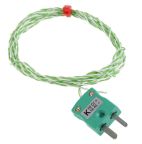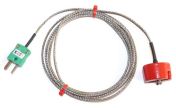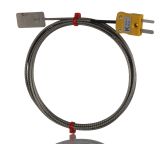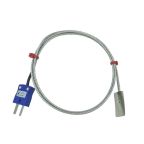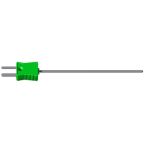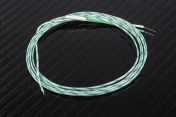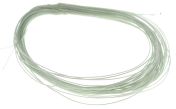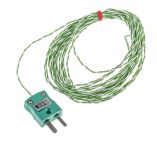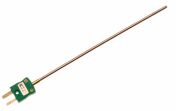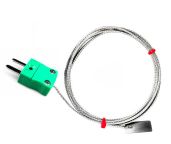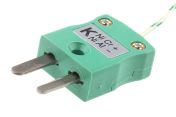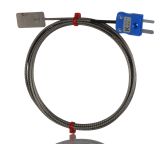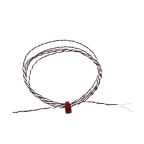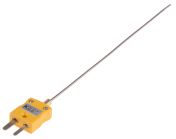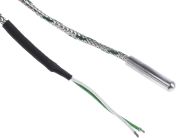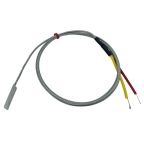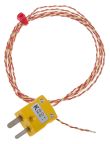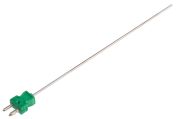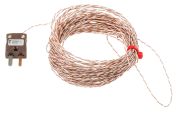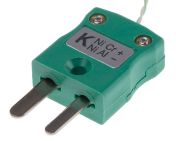Thermocouples
A thermocouple is a type of temperature sensor that converts thermal energy into electrical energy. They are widely used in various industries for temperature measurement and control due to their wide temperature range, robustness, reliability, and cost-effectiveness. RS offers a comprehensive range of thermocouples, including thermocouple Type K, thermocouple sensors, and other thermocouple types, to meet your specific temperature sensing needs.
How Thermocouples Work
A thermocouple temperature sensor consists of two dissimilar metal wires joined together at one end, forming a junction called the sensing junction or hot junction. The other ends of the wires are connected to a measurement device (e.g., a voltmeter, temperature controller), forming the reference junction or cold junction. When there's a temperature difference between the sensing junction and the reference junction, a small voltage is produced that is proportional to the temperature difference.
This phenomenon is the Seebeck effect, where a temperature difference creates a voltage difference.This voltage is measured by a voltmeter or specialised device. To determine the temperature, the measured voltage is compared to a calibration table or equation specific to the thermocouple.
Types of Thermocouples
Thermocouple are categorised by the types of metals used in their construction, which determine their temperature range, sensitivity, corrosion resistance, and suitability for different applications. Each thermocouple is designated by a letter, such as Type J, Type K, Type T, Type E, Type N, Type R, Type S, and Type B.
Type K Thermocouples
K-type thermocouples are the most common type, offering a wide temperature range (typically -200°C to +1350°C) and good oxidation resistance. They are made from nickel-chromium and nickel-aluminium alloys and are suitable for various industrial applications.
Type J Thermocouples
J-type thermocouples are made from iron and constantan (a copper-nickel alloy) and are known for their high sensitivity cost-effectiveness. They have a narrower temperature range than Type K thermocouples (typically -40°C to +750°C) and are more prone to oxidation, especially at higher temperatures. They are commonly used in general-purpose temperature measurement applications.
Type T Thermocouples
T-type thermocouples are made from copper and constantan and are known for their accuracy and stability at lower temperatures. They are often used in cryogenic and refrigeration applications, with a typical temperature range of -200°C to +350°C. They are also resistant to corrosion in moist environments.
Type E Thermocouples
E-type thermocouples are made from chromel and constantan and offer a higher output voltage than Type K thermocouples, making them more sensitive to small temperature changes. They have a temperature range of -50°C to +900°C and are suitable for use in inert or oxidising atmospheres.
Type N Thermocouples
N-type thermocouples are made from nicrosil (nickel-chromium-silicon alloy) and nisil (nickel-silicon alloy) and offer improved stability and oxidation resistance compared to Type K thermocouples, especially at high temperatures. They have a temperature range of -270°C to +1300°C and are commonly used in demanding industrial applications.
Type R and Type S Thermocouples
These thermocouples are made from platinum and platinum-rhodium alloys and are known for their high accuracy, stability, and resistance to corrosion at high temperatures. They are used for measuring temperatures up to 1600°C in demanding applications such as furnace control and precious metal processing. Type S is slightly less accurate but more commonly used due to its lower cost.
Type B Thermocouples
Type B thermocouples are also made from platinum-rhodium alloys but have a slightly different composition than Type R and Type S thermocouples. They are suitable for measuring temperatures up to 1820°C and offer excellent stability and reproducibility.
Thermocouples can be further categorised based on their construction:
- Grounded Thermocouples: In grounded thermocouples, the thermocouple wires are in direct contact with the protective sheath, providing faster response times as the heat transfers more efficiently. However, they are more susceptible to electrical noise and can create ground loops.
- Ungrounded Thermocouples: In ungrounded thermocouples, the thermocouple wires are insulated from the sheath, providing electrical isolation and reducing the risk of ground loops. However, they have slower response times due to the thermal resistance of the insulation.
- Exposed Thermocouples: Exposed thermocouples have no sheath, offering the fastest response times but limited protection against harsh environments. They are suitable for measuring the temperature of air or non-corrosive gases.
Industrial Applications of Thermocouples
Thermocouples are versatile temperature sensors used in a wide range of industrial applications, providing accurate and reliable temperature measurement in various processes and environments.
- Process Manufacturing: Thermocouples are extensively used in process manufacturing industries, such as chemical, petrochemical, and pharmaceutical, to monitor and control temperatures in reactors, vessels, and pipelines.
- Discrete Manufacturing: In discrete manufacturing, thermocouples monitor temperatures in machinery, equipment, and processes, such as welding, heat treatment, and plastics processing.
- Energy & Utilities: The energy and utilities sector utilises thermocouples to monitor temperatures in power plants, boilers, and other critical infrastructure.
- Facilities & Intralogistics: Thermocouples monitor temperatures in HVAC systems, refrigeration units, and other building systems, ensuring comfortable and safe environments in commercial and industrial facilities.
- Automotive: Thermocouples are used in automotive applications to monitor exhaust gas temperatures, engine temperatures, and other critical parameters.
- Aerospace: Thermocouples are used in aerospace applications to monitor temperatures in jet engines, turbines, and other critical components.
- Medical: Thermocouples are used in medical equipment, such as incubators and sterilisers, to monitor and control temperatures for patient safety and medical procedures.
- Food & Beverage: Thermocouples monitor temperatures in food processing, storage, and transportation, ensuring food safety and quality.
How Accurate Are Thermocouples?
The accuracy of a thermocouple depends on several factors, including the type of thermocouple, the quality of the materials used, the construction of the sensor, and the calibration process. Generally, thermocouples offer good accuracy for industrial temperature measurement applications, with typical accuracies ranging from ±0.5°C to ±2.2°C.
However, it's important to note that thermocouples are subject to certain errors and limitations that can affect their accuracy:
- Cold Junction Compensation: Thermocouples measure the temperature difference between the measurement junction and a reference junction. The reference junction, often referred to as the cold junction, needs to be at a known and stable temperature for accurate measurements. Cold junction compensation techniques, such as using a reference temperature sensor or electronic compensation circuits, are used to minimise this error.
- Linearity: The relationship between the thermocouple's voltage output and the temperature difference is not perfectly linear. Calibration tables or equations are used to compensate for this non-linearity and improve accuracy.
- Noise and Interference: Thermocouples can be susceptible to electrical noise and interference, which can affect the accuracy of the voltage measurement. Shielding, twisted-pair wiring, and proper grounding techniques can help minimise these effects.
- Ageing and Drift: Over time, the thermocouple materials can undergo ageing and drift, affecting their sensitivity and accuracy. Regular calibration can help maintain accuracy and compensate for these changes.
Despite these potential errors, thermocouples remain a popular choice for industrial temperature measurement due to their wide temperature range, robustness, and cost-effectiveness.
What Are the Advantages of Thermocouples Over Other Temperature Sensors?
Thermocouples offer several advantages over other temperature sensors, making them a popular choice in various applications:
- Wide Temperature Range: Thermocouples can measure a wide range of temperatures, from cryogenic temperatures to over 2000°C, depending on the type of thermocouple used.
- Fast Response Time: Thermocouples have a fast response time to temperature changes, making them suitable for applications requiring rapid temperature measurement.
- Durability: Thermocouples are robust and can withstand harsh environments, including high temperatures, pressures, vibration, and exposure to corrosive substances.
- Cost-Effective: Thermocouples are relatively inexpensive compared to other temperature sensors, making them a cost-effective solution for many applications.
- Simple Construction: Thermocouples have a simple construction, consisting of two wires joined together, making them easy to manufacture and install.
- Self-Powered: Thermocouples generate their own voltage signal based on the temperature difference, eliminating the need for external power sources.
Thermocouple Colour Codes
Thermocouple wires are often colour-coded to facilitate identification and ensure proper connection. Here are some commonly used thermocouple colour codes:
- Type K: Positive wire: Green; Negative wire: White
- Type J: Positive wire: Black; Negative wire: White
- Type T: Positive wire: Brown; Negative wire: White
- Type E: Positive wire: Purple; Negative wire: White
- Type N: Positive wire: Pink; Negative wire: White
It's important to note that colour codes can vary depending on the country or industry standards. Always refer to the manufacturer's documentation or relevant standards for accurate colour code information.
Trusted Thermocouple Supplier & Distributor in Malaysia
RS is a leading supplier and distributor of thermocouples in Malaysia. We offer a wide selection of high-quality thermocouples, including thermocouple Type K, thermocouple sensors, and other thermocouple types, from top brands like Electrotherm, Prosensor, and RS PRO. Our thermocouple prices also cater to diverse budgets. Buy your thermocouple from RS and experience quality, reliability, and expert advice.
Buy Thermocouple Online from RS
Looking for a reliable thermocouple or a specific type like a K-type thermocouple? Buy your thermocouples online, along with temperature controllers and temperature loggers, to ensure accurate and reliable temperature measurement in your applications. We offer competitive prices and a seamless online ordering experience. Enjoy fast, nationwide doorstep delivery. For detailed delivery information and fees, visit our Delivery page.
